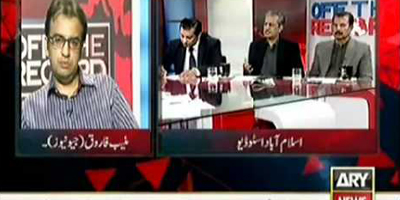Media's dirty war - who won, who lost?
JournalismPakistan.com | Published: 3 May 2014 | Daud Malik
Join our WhatsApp channel
The attack on journalist Hamid Mir has intensified divisions within Pakistan's media. This situation highlights the struggle for freedom of expression amid infighting among media houses.Summary
ISLAMABAD: Almost two weeks since the attack on Hamid Mir in Karachi, a rhetorical question can be asked: Who has suffered more – the anchorperson or the media as a whole or the right to freedom of expression?
Going by the bitterly divisive atmosphere after April 19, there can be more than one answer, again highlighting the divide that is defining any debate on media freedom in Pakistan.
It is now no more a secret that the reaction to the attack on Mir from “both” sides has taken the attention away from journalists who have been killed and those who have been harassed and tortured. With no holds bar, the focus instead is on the infighting among the media houses and the “anchorpersons”.
On this year’s World Press Freedom Day, journalism and media are more than confused, lost in the vituperative tweets and retweets and manipulative presentation of information. The calls for restraint, ethical journalism, code of conduct and not going too far in infighting so as to lose the press freedom have fallen on proverbial deaf ears.
The media itself has become “burning” news in Pakistan, with salt and spice provided by the talk shows full of innuendoes, allegations and counter allegations. Today the fear is that these divisions will ultimately take away the freedom media has fought for in Pakistan, especially after 2007.
After 2007 in the background of campaign to restore the judiciary almost every assessment report obviously mentions emergence of two fundamental changes in Pakistan – an independent judiciary and a freer media. Though both the judiciary and media were lightly rapped for presenting themselves to the people of Pakistan as new messiahs, their suo motu and aggressive posturing were taken as part of new vibrant Pakistan.
But the shocking infighting between media houses shows that much more is at stake than the abstracts of freedom of expression, ethical journalism, and code of conduct. Declan Walsh, no stranger to Pakistani media, puts it bluntly in his piece - Attack on Journalist Starts Battle in Pakistani Press: “Mr. Rehman (Mir Shakeel) of the Jang group has a rancorous relationship with Sultan Lakhani, who owns the smaller Express media group, which includes a television station and several newspapers (One of those papers, the English-language Express Tribune, prints The International New York Times in Pakistan). A third station, ARY, is owned by a family of gold dealers that has little love for Mr. Rehman.”
Though many felt strong editorial control on April 19 may have avoided the “crisis”, the control of owner as driver of editorial direction is perhaps making all other players in the media industry irrelevant. It is no surprise that a mixture of patriotism and media ethics underpinned by huge commercial interests has pitted known journalists against each other – tweet for tweet, talk show for talk show and column for column.
(The writer is a senior journalist who has worked for The News and Dawn)
KEY POINTS:
- Hamid Mir's attack has shifted focus from journalists' safety to media infighting.
- Calls for ethical journalism and restraint have largely been ignored.
- The rivalry among media owners impacts the integrity of news reporting.
- The crisis may undermine the progress made in media freedom since 2007.
- Editorial control and commercial interests complicate journalistic ethics.

























